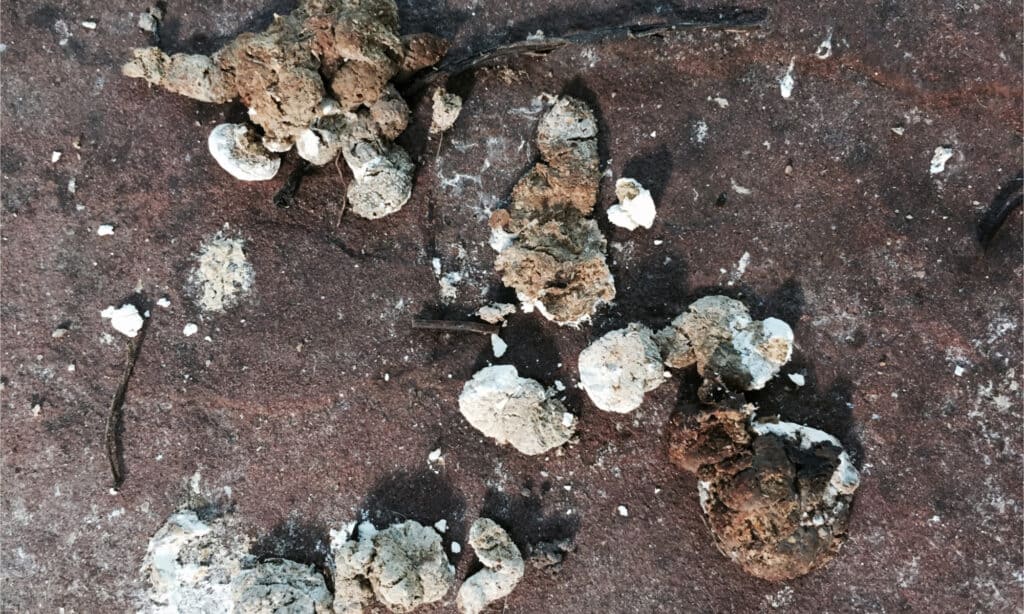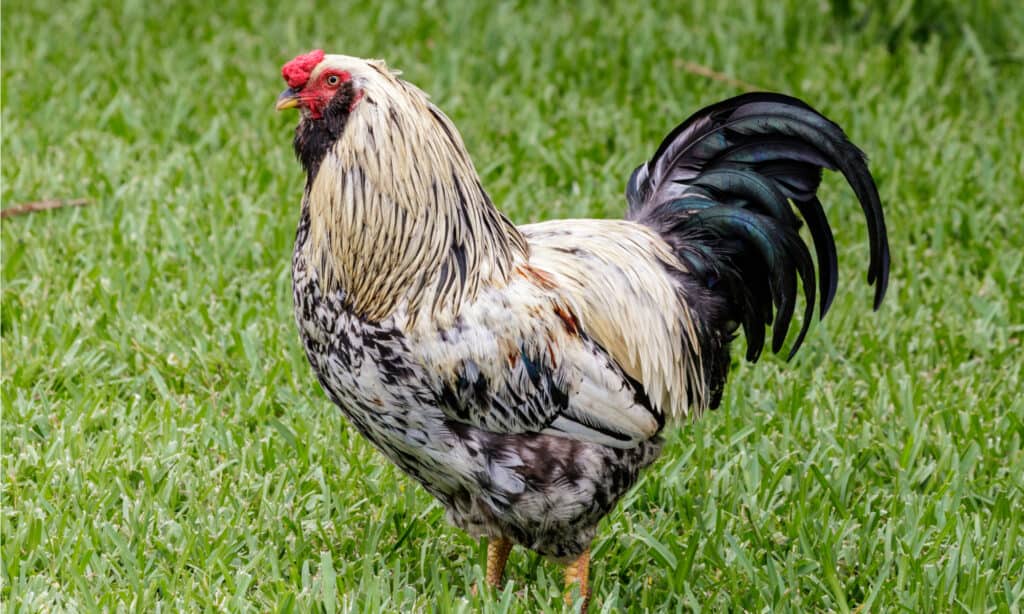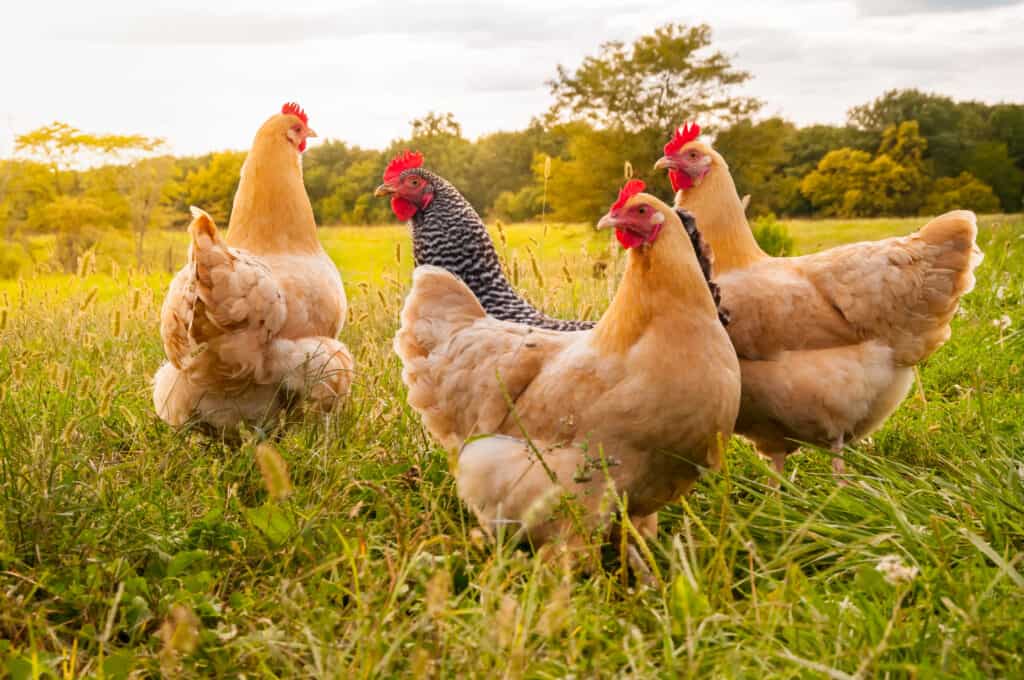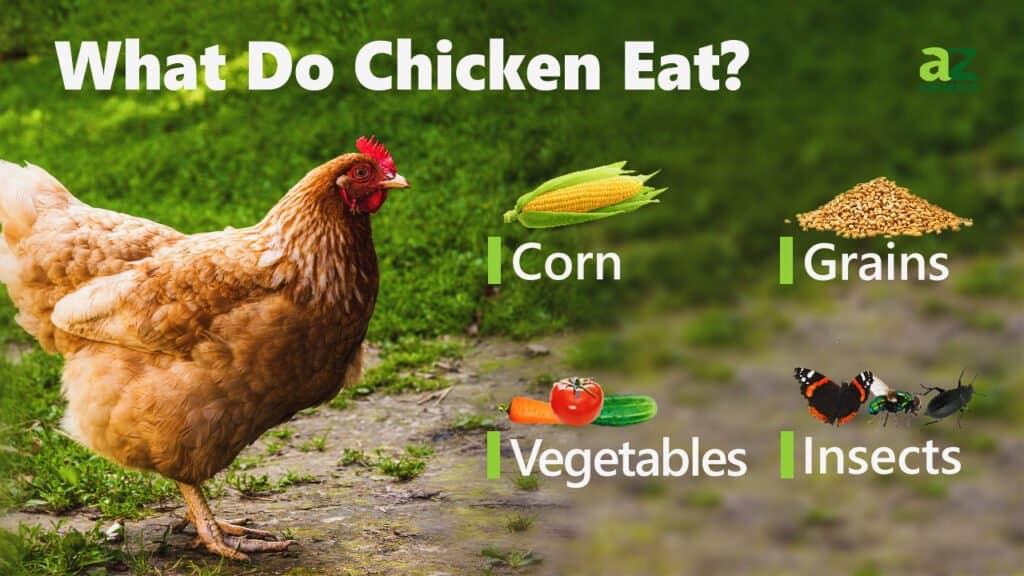If people were asked what they knew about chicken poop, the answer would most likely be that it smells. Asides from this, people know close to nothing about chicken poop. This article explains everything you need to know about chicken poop.
What Does Chicken Poop Look Like?

You have a healthy chicken if your chicken’s poop is brown or green with white caps.
©Kritsada.S/Shutterstock.com
Regular chicken poop is usually a shade of brown with a fluffy white cap. The whitecap is uric acid which would be urine in humans, while the brown part is the feces proper. The poop is usually moist, soft, and mushy. There might be variation in the poop of different chickens as factors like diet and season can affect the nature of chicken poop. However, healthy chicken poop would generally fit the description above.
One usual exception in chicken poop is the cecal poop which is more moist, runny, and smelly. It is usually excreted twice a day and comes from the cecum, a part of the bird’s internal organs where digestion happens. Although this poop looks different from your regular chicken poop, it is no reason to be worried. It is, instead, a sign that your chicken’s digestive tract is working perfectly fine.
What Can Chicken Poop Tell You About Chickens?

Chicken poop can say a lot about a chicken’s health.
©Microfile.org/Shutterstock.com
A ton of information can be obtained just by studying chicken poop. This will include taking note of the color and the form of the feces. It can provide a host of information about your chicken’s health, diet, and other things. Below are the different information that can be gleaned from observing chicken poop.
Health Information
By observing the poop of your chicken, you can tell how healthy it is. You have a healthy chicken if your chicken’s poop is brown or green with white caps. At other times, a color change can be a cause for alarm. An example would be consistent bloody droppings indicating that your chicken is suffering from coccidiosis, a disease caused by bacterial infections that inflames the intestines.
Another case would be black feces, which could signify internal bleeding. Yellow poop, conversely, can indicate a case of coccidiosis, internal parasites, kidney issues, or typhoid. Orange or red poop could be another indicator of disease or poisoning. Coccidiosis or lead poisoning could be the case in this situation. White poop is also an indicator of kidney disease, tension, internal illness, or vent gleet. It is worth mentioning that all these different colors of feces can occur without being a sign of infection. To be sure, check for the other symptoms that follow these various diseases. When in doubt, it is safe to check with the vet.
Dietary Information
Another way chicken poop can help you monitor your chickens is by serving as a diet indicator. Different colors and forms of chicken scat could signify that your poultry is either feeding on a particular kind of food or is lacking or having too much of a specific type of food.
If your chicken droppings are white and watery, it could signify that your chicken is consuming too much water or waterlogged foods like watermelon and celery. Yellow poop, on the other hand, is just a sign that your chicken has been consuming either strawberries, corn, squash, or forsythia blooms in excess. Black poop indicates that your chicken consumes charcoal, blackberries, or other dark-colored foods.
How Often Do Chickens Poop?

Although in little quantities, chickens poop at least 15 times a day.
©Moonborne/Shutterstock.com
Chickens poop at least 15 times a day but in little quantities. However, when the hen is breeding, she spends more time with her eggs and only goes out twice a day to find food and excrete poop. Due to this situation, she can only excrete twice a day and, thus, offloads a ton of poop at a time. This unusual poop stack only happens with breeding hens. If you find this with your hen, she is most likely breeding.
What Do Chickens Eat?

Since chicken poop is a byproduct of its diet, it is essential to know exactly what the chicken eats. Opposed to popular opinion, chickens aren’t herbivores but omnivores. While it is true that they consume lots of grains, they also feast on small animals ranging from insects like cockroaches, locusts, and crickets to lizards, small snakes, and small mice. Chickens that are bred industrially consume feed that is made from both plant and animal condiments. The feed’s energy is obtained from grains, while the protein comes from animal and plant protein sources.
Is Chicken Poop Useful?
Chicken poop is not all garbage and can be put to great use on farms and even in gardens. This is because it comprises many macro and micronutrients that can enrich the soil and improve its productivity. It can also be useful to fish farmers as it can serve as food for fish and also improve the nutrients within ponds or water habitats. It’s noteworthy that chicken poop is not to be used in its raw form but only after it has been composted. Handling in its raw form can harm both plants and humans.
Is Chicken Poop Dangerous?
Although it is helpful as manure, chicken poop can be very deadly to humans as it can transmit diseases to other animals, including humans. This is due to the presence of disease-causing bacteria called Salmonella and Campylobacter (which can result in campylobacteriosis in affected humans). Although these bacteria can exist in the tract of a healthy chicken without causing any harm, they can be easily transferred to humans who come in contact with poultry poop.
Children are more susceptible as they are more likely to come in contact with chicken poop when playing. Another disease that can be attributed to chickens is Histoplasmosis. This infection is airborne and is caused when people breathe in the spores of a fungus found in chicken feces. These spores can get into the air during human activities like demolition and cleanup. It is best to avoid having contact with poultry poop if you do not have any reasons to engage with it.
The photo featured at the top of this post is © Drakuliren/Shutterstock.com
Thank you for reading! Have some feedback for us? Contact the AZ Animals editorial team.







